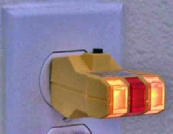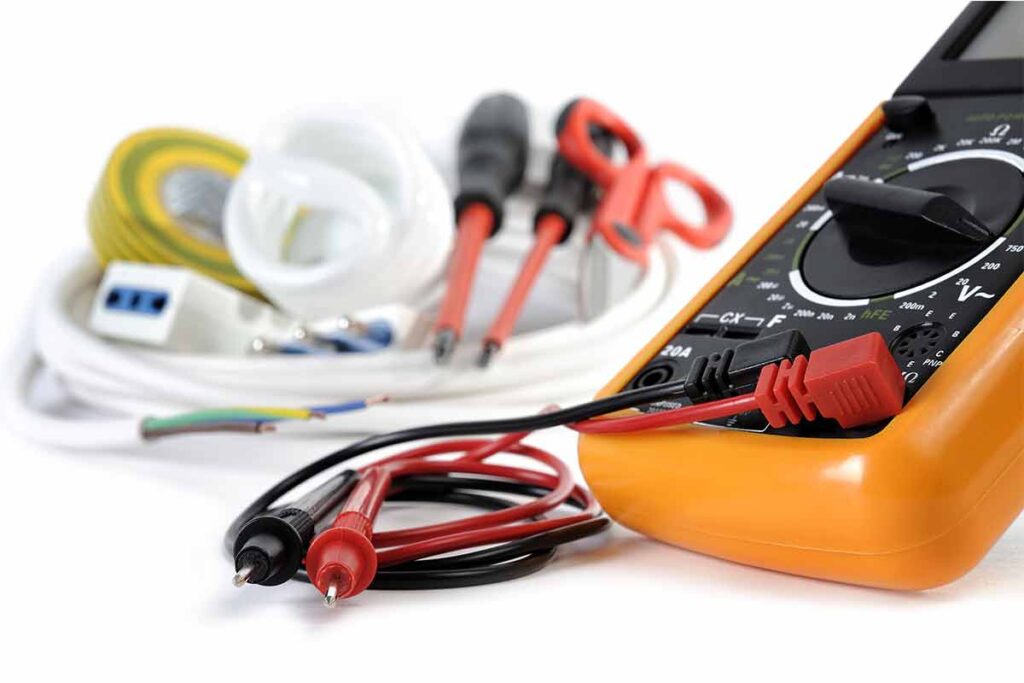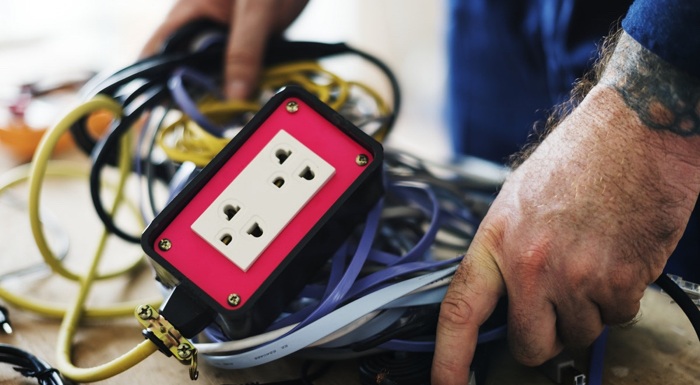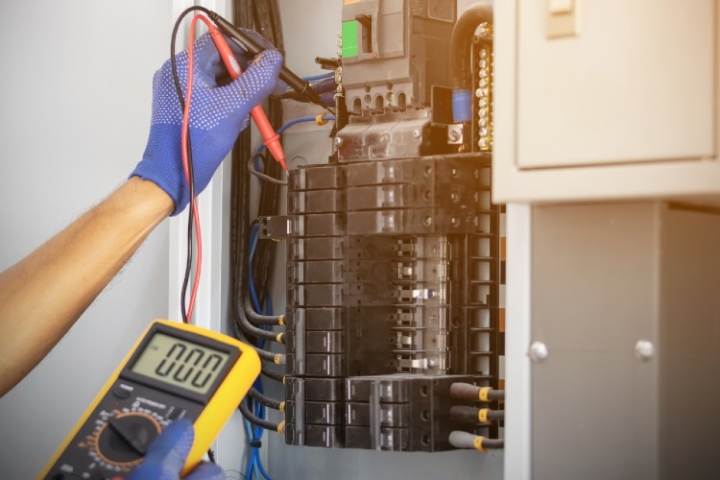Home Inspections
Home inspections are a part of the home sale process. They are usually done sometime after a purchase agreement is signed. A purchase agreement should contain a clause that the sale is contingent on the results of an inspection. A new mortgage or a home warranty typically requires an inspection.
It is a good idea for the buyer to have a home inspected before it is listed for sale, especially if the seller wants a fast closing. Any problems found can be fixed before the home gets listed and there won’t be any costly surprises after the agreement is signed.
What is a Home Inspection?
A home inspection is an inspection of the structure and systems of a house. They typically include the foundation, basement, heating system, plumbing, central air conditioning, electrical, roof, and attic. An inspection should be done by someone who is certified by the American Society of Home Inspectors (ASHI).
Electrical Panel Inspection
During an electrical panel inspection the inspector typically looks for the following:
Clearance in front and top of the panel (3 feet deep and 30 inches wide) (6 feet headroom on top of panel).
Proper wiring, grounding, and bonding.
Discolored, oxidized, corroded, or damaged wires.
Correct circuit breaker or fuse amperage ratings. Breaker size shall be 15 amps for #14 (AWG) wire, 20 amps for #12 wire, and 30 amps for #10 wire, and 40 amps for #8 wire.
Only one wire is allowed to be connected to each circuit breaker.
Check for copper and aluminum wires and whether the breakers are listed for copper or aluminum
It is not unusual for a home inspector to find a #14 wire (15 amp circuit) connected to a 20 amp breaker. When a 15 amp circuit is overloaded and the circuit breaker trips often, someone may replace the 15 amp breaker with a 20 amp breaker. This situation could be a fire hazard or cause the whole circuit to fail.

What Your Electrician Looks For During an Electrical Inspection
My hometown of Oak Ridge, Tennessee, is full of relics of the American Atomic Age—after all, the city was built with the sole purpose of housing the federal employees who processed and refined the uranium that powered the massive weapon that effectively ended World War II.
As you drive around the city these days, you can still see remnants of the 1940s version of Oak Ridge in the neighborhoods of war-era, government-issued modular homes and the post-war, cement block homes that were constructed once it became clear that the city’s residents were here to stay
I grew up in one of those late-1940s cement block homes, and while I loved living in a little piece of history, I can tell you that that house was an electrician’s nightmare. Or dream, perhaps, depending on your perspective
The wiring was modern enough that we had a standard main panel with circuit breakers instead of fuses, but I didn’t know that GFCI outlets were a thing, much less a necessity, until I owned a home of my own. The solution to the problem of only one outlet in the kitchen? A power strip attached to the countertop with double-stick tape. Did the kitchen circuit breaker trip if you used the microwave while you were making toast? Absolutely—every time.
Do I Need an Electrical Inspection?
The short answer is yes (probably). “Ninety-nine percent of the time, homeowners aren’t aware that they need an inspection,” Wes notes. Some electrical problems are easy to ignore, after all. A circuit breaker tripping from time to time probably doesn’t occupy much space in your brain once you’ve reset the breaker and restored power, and you’re in good company if you’ve never tested the GFCI outlets in your house.

What Sellers Can Expect from an Electrical Home Inspection
home inspection covers a lot of details to make sure that the house you’re selling is up to code, safe for a potential buyer, and doesn’t have a costly hidden maintenance issue. But even though home inspectors are trained to identify a lot of issues, they might recommend that a buyer call on an electrician’s expertise for an electrical home inspection
That’s often because of a home’s age, its wiring, and whether the electrical service panel has been updated. “A lot of older homes have different wiring,” said Glover “There’s a wiring called knob-and-tube that still exists in a lot of homes today. There are some complications with that.”
Electrical home inspections 101: Keeping your home’s wiring safe and up to code
Your home’s electrical system is a vital component of protecting your family—and anyone who buys your home. Electrical distribution or lighting equipment in the home remains the 4th leading cause of home fires, according to the National Fire Prevention Association.
The National Fire Protection Agency said in a 2017 report that electrical distribution, lighting, and power transfer equipment was involved in 57% of home structure fires from 2010 to 2014.
In all, U.S. firefighters from 2010 to 2014 responded to an estimated annual average of 45,210 home structure fires with some type of electrical failure or malfunction, the NFPA said. These fires caused an estimated $1.4 billion in property damage and killed an estimated 420 people and injured about 1,370, NFPA statistics show.

Electrical Inspection: A Detailed Overview
Many homeowners ignore the precautionary measures that have been detailed in different governmental policies, for different electrical installations. There will be times when you will be boggled as to why the inspector has failed your electrical inspection. There are many reasons for a failed inspection, which are very common and generally ignored by the house owners.
What is an Electrical Inspection?
An electrical inspection refers to the thorough checkup of the electrical connections and wiring installed in your home.
Who is an Electrical Inspector?
An electrical inspector is an authorized person from the government and municipality who is responsible for checking the electrical connections to ensure they comply with the law codes and requirements in the area.
Why is Electrical Inspection Important?
There are many reasons behind the necessity of getting an electrical inspection done. Some of the most common ones are:
Protection against possible surges: This is a common phenomenon in different regions, especially when there is a storm. Electrical surges can not only ruin your appliances, but can also create short circuits in your house. When the inspection is being done, the inspector will check for different points in the wiring that can cause this type of mishap.
Fire: Many a times it has been seen that an electrical short circuit has been the reason behind a fire breakout in a house. These short circuits are caused by different loose wires in the meter or in the cabling itself. During the inspection, the inspector can easily recognize these faults and ask you to rectify them.
Shocks: Imagine touching an electronic appliance and immediately experiencing a surging electric current in your body. Although the impact may not be that disastrous; however, this could lead to other mishaps easily. Apart from this, the body current in an electronic appliance can easily hamper its performance or can render it completely non-workable. An electrical inspector can catch these faults in the wiring in time to rectify them
How to Prevent Different Problems during Electrical Inspection?
Your mind just might be full of questions as to why you failed an electrical inspection. While the reasons may vary, it is always better to know what to do before an inspection to avoid failure. Some of the main points are:
Research: Check all the possible norms and procedures that you might need to follow while installing different wires and cables. Apart from this, a proper research will also help in ensuring that you do not stand clueless, while the inspector does the inspection.
Proper equipment: The electric wires and cables in your house should be authentic in nature. They should be made as per the norms and requirements of the state laws.
The right technician: It is imperative that you get the right electrical technician to work in your house. A novice or amateur might just damage the electrical connections that could lead to different types of disasters, apart from you failing the inspection.
The costs involved: It is advisable to check the charges involved in getting an inspection done. While some places will not charge you at all, some others may charge, especially if it is a repeat visit. You would also need to know the necessary paperwork you would need before and during the inspection. Getting the paperwork done beforehand will help save a lot of time.

WHY REGULAR ELECTRICAL SAFETY INSPECTIONS ARE ESSENTIAL
Electricity is one of the biggest conveniences of the modern times. And when your lights, electrical appliances, and other gadgets are all working well, it is easy to assume that the underlying electrical work is in perfect condition. Even when something goes wrong, there is always a quick and easy fix, like replacing a bulb or a broken component in an appliance.
What Does An Electrical Home Inspection Entail?
Electrical home inspections involve the meticulous assessment of your entire electrical system to ensure that all electrical systems, cables, and components – including your home’s wiring and electrical appliances – satisfy the legal safety standards.
All licensed electricians operate under a National Code when assessing your residence, and are required to provide you with a detailed and prioritised list of areas that need immediate attention, as well as recommendations for improvements and upgrades.
In addition to performing a home electrical safety check before moving into your new home, scheduling regular visits by your residential electrician every few months can help to identify and address problems in your home’s electrical system long before they develop into unexpected failures that require more expensive emergency electrical service.
Performing Electrical Inspections
For an electrical inspection to be truly helpful, it should only be performed by a licensed electrician with the skills and competency to perform electrical safety checks. You need a residential electrician who has been trained on common issues to look for in residential properties, and how to correct any problems they find.